#latinamerican literature
Text
i don't understand people who won't watch/read anything with characters who are just horrible people as if the best kind of media isn't supposed to make you want to throw up and die <3
#i carry this belief since i started reading latinamerican literature in elementary school#if a book doesn't leave you sick and empty inside what's even the point
24 notes
·
View notes
Text
i love how well the show got the magical realism this season. being latinamerican makes it a genre very near and dear to my heart. I have fond memories of learning to understand and process the complexities of our realities through that literature when I was a lot younger.
and it's so sad how often people get it wrong. magical realism isn't fantasy, it isn’t "this magical thing happened because so and so."
it's a way of unveiling our reality through the soft magical touches, of showing the hurt and the hope through the whimsy the world can contain. it's buttons becoming a seagull so we could see ed was still in pain, so ed could learn a lesson about change, and so we'd all understand as an audience that this was a season all about change and transformation
#every day I'm more and more in love with this season and this show#also the suit was cursed fight me#ofmd spoilers#ofmd#alex watches ofmd
26 notes
·
View notes
Text
Sure your european band is good but do they love latinamerica so much they made songs inspired by legends and literature of latinamerican culture with genuine love and admiration
16 notes
·
View notes
Text
Taking a class on Latinamerican literature and I feel insanely unqualified to be in it but it’s so compelling and interesting and cool that I hella wanna try and stick with it. Just finished first draft of first assignment shit was hard but so dope and the texts we’ve seen already have been so insanely sick and the professor is the most interesting and knowledgeable dude I’ve ever met it’s just a lot of work for essentially a throwaway class I decided to take on a whim to try and find new authors to read
2 notes
·
View notes
Text
Goals for this year is to read
Chicana Literature
Mexican American Literature
Post nationalism in Chicana Literature
Akkadian Literature
Ancient Egyptian Literature
Dalit Literature
Latin literature
LatinAmerican Literature
Ismaili Literature
Persian Literature
Turkish Literature
Armanian Literature
3 notes
·
View notes
Text
So, for my latinamerican literature class I had to read this Peruvian novel and it was SO good like actually oh my god I just finished it IT HAD THE PLOT TWIST OF THE CENTURYYYY love it 10/10
#Aves sin nido if you want to search it#next i have to read something by a Chilean author but idk what is it yet#Iny rambles
4 notes
·
View notes
Text
20 questions
Tagged by @mwolf0epsilon! This should be fun!
How many works do you have on AO3?
14, literally a normal amount-
What’s your total AO3 word count?
47,285, normal amount
What fandoms do you write for?
Star Wars, but I usually write for most fandoms I'm in, I just never post
What are your top five fics by kudos?
-Your Beauty Never Ever Scared Me
-There'll Come Miracles (there'll come chrysalides)
-More Than Fifty Summers (since we saw each other)
-i'm dying to know you (know what are you thinking)
-Happiness Has Brought You Here
Do you respond to comments? Why or why not?
Yeah, if I remember to. I just think it's neat that people take time to write down their thoughts you know?
What’s the fic you wrote with the angstiest ending?
Definitely Even As Time Goes By And You're Happy With Someone Else, literally angst all the way through
What’s the fic you wrote with the happiest ending?
Born of Laughter, nothing bad happens!
Do you get hate on fics?
Thankfully I haven't, and I hope I don't
Do you write smut? If so what kind?
I do, it's the kinkiest shit ever. You'll never know because I'll never post it.
Do you write crossovers? What’s the craziest one you’ve written?
No I don't. I, however, have like a whole crossover universe in my head, but I'll never write it down 💕
Have you ever had a fic stolen?
No and again i hope it never happens
Have you ever had a fic translated?
No but does it count if I did the translation? But i don't think it does
Have you ever cowritten a fic before?
Nopee, but i would like to for sure
What’s your all-time favourite ship?
I don't have an all time favorite, i like different things like, Rex + Anakin + Padme is very very top but only when explored right
What’s a WIP you want to finish, but doubt you ever will?
Vaughn on the Cliff, the reconditioned Rex and the mer Rex fics man :( I've been stuck with them for MONTHS
What are your writing strengths?
People have told me they love the language i use, describe it as "flowery". I apparently also write compelling emotions, you can feel the character. I will forever point towards latinamerican literature for this one
What are your writing weaknesses?
I hate the way I do pacing, but I'll always say it's because that's how most stories in Spanish are made. The mere fact English is not my first language is very limiting as well
Thoughts on writing dialogue in another language for a fic?
Please please PLEASE ask someone who speaks the language for feedback if you can!! One of my most horrid memories is the WORST Spanish ever written, just ask for help don't trust Google Translate
First fandom you wrote for?
The Legend of Zelda. I'll never forget that one
Favourite fic you’ve ever written?
Favorite by premise? Your Beauty Never Ever Scared Me and Happiness Has Brought You Here. By the way i wrote it?
No pressure tags @sulevinen and @fluffycatofdooom!!
1 note
·
View note
Text
Recommended books (from A to Z). Plot twist: they were written by women
To commemorate the International Women's Day, I have compiled a list of books translated into English written by Latin American women to give visibility to the great contribution that women writers make to the world’s literature. For translation reasons, the list in Spanish has different works and writers. So you can see that list also and have even more great options!
A: A Breath of Life by Clarice Lispector
B: Bezoar: And Other Unsettling Stories by Guadalupe Nettel
C: Cartucho and My Mother's Hands by Nellie Campobello
D: The Dangers of Smoking in Bed by Mariana Enríquez
E: Empty Houses by Brenda Navarro
F: Faces in the Crowd by Valeria Luiselli
G: Prietita and the Ghost Woman by Gloria Anzaldúa
H: Hurricane Season by Fernanda Melchor
I: The Inhabited Woman by Gioconda Belli
J: The Japanese Lover by Isabel Allende
K: Cockfight by María Fernanda Ampuero
L: The Book of Lamentations by Rosario Castellanos
M: Mask and Clover: Magnetized Circles by Alfonsina Storni
N: No One Will See Me Cry by Cristina Rivera Garza
O: Blood of the Dawn by Claudia Salazar Jiménez
P: The Promise by Silvina Ocampo
Q: Yaqui Delgado Wants to Kick Your Ass by Meg Medina
R: Recollections of things to come by Elena Garro
S: Las Soldaderas: Women of the Mexican Revolution by Elena Poniatowska
T: The Houseguest: And Other Stories by Amparo Dávila
U: Underground River and Other Stories by Inés Arredondo
V: Lost Children Archive by Valeria Luiselli
W: Woman Hollering Creek and Other Stories by Sandra Cisneros
X: Mexican Gothic by Silvia Moreno-García
Y: Thursday Night Widows by Claudia Piñeiro
Z: Zorro by Isabel Allende
Who are your favorite Latin American women authors?
#international women’s day#latin america#latin american literature#américa latina#latinoamérica#women in literature#books by women#book recs#8 de marzo#read women#read diverse#diverse books#clarice lispector#silvia moreno garcia#isabel allende#día internacional de la mujer#my post#latinamerican literature
167 notes
·
View notes
Text
No son tú
La tengo aquí, recostada a mi lado, con el cuerpo sudoroso, cansada tras la actividad carnal que se llevó hasta hace apenas unos minutos. Sus piernas están enredadas con las mías, sacando mis intenciones por salir de la cama, por lo que me quedo con la mirada fija en el techo de la habitación, rememorando lo que me trajo a este preciso instante.
Miró su rostro, examinando cada facción. Sus ojos están cerrados, sus labios, ligeramente hinchados por el encuentro previo, sus mejillas están sonrojadas tanto por el esfuerzo previo como por la calidez de la noche. Una calidez que hace mucho no siento, por lo menos no del todo.
En mi pecho ahora queda el rastro de lo que alguna vez fuese una llama que calentaba mi pecho, de una época en la que sólo bastaba con pensar su nombre para sentir un vacío en el estómago, un nudo en la garganta y que los vellos de mi cuerpo se erizaran. Aquellos momentos en los que la tuve a mi lado son los que invaden mi mente en noches como ésta, donde al tren de mi pensamiento de le gusta viajar y hacer escalas en escenas precisas donde ella es la protagonista, donde ella me llevó al cielo para que ahora, en este infierno, las reviva de manera tan lúcida. Porque su re cuerdo viene a torturar mi mente a trapanarme el psique y decirme al oído que estoy condenado, atado de por vida a ella, aún cuando no esté a su lado, aunque haya elegido su camino entre los brazos de algún hombre que no soy yo. Condenado a trate ar de olvidarla infructuosamente, porque ninguna mujer será ella, no llenarán el vacío que existe dentro de mi corazón.
Mi alma tiene su nombre, grabado como si de piedra se tratara ¿Pensara en mi? ¿Logré de algún modo hacerme un pequeño espacio dentro de su corazón? Lo dudo.
Una pequeña lágrima recorre mi mejilla, prescindiendo a las muchas que le siguen. Lloro en el silencio de la noche, porque la mujer que hace unos instantes hice mía no es ella, porque ninguna de las mujeres que he tenido entre mis brazos huelen como ella, besan como ella. Mi mente termina por transportarme a su lado, por ponerla en frente de mi. Debo mantener mis ojos abierto porque cada vez que los cierro la veo a ella, la siento a ella, la beso a ella...
Limpio mis lágrimas con el dorso de la mano cuando siento como su brazo aprieta mi pecho y la oigo gemir de cansancio.
-Duerme, es tarde- me dice con voz fatigada antes de soltar un ligero bostezo.
-Está bien
Cierro los ojos y se hace presente. Sus ojos me ven directamente, conectando con los míos, sonriendo con esos labios a los que me volví adicto. Me dice algo que no logro escuchar.
-Te a...
47 notes
·
View notes
Text
Escribir y pintar en la Colonia
por Javiera Barrientos G.
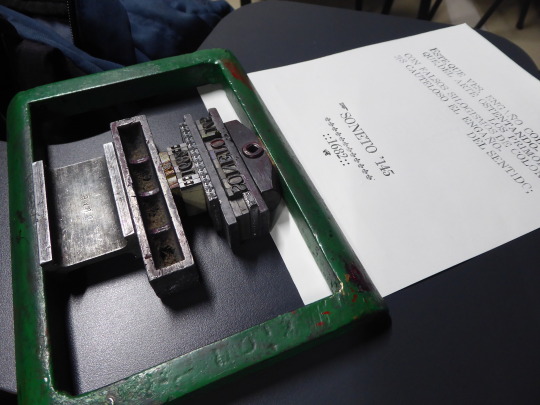
El semestre pasado dicté el curso de Literatura Colonial Latinoamericana en la Universidad Alberto Hurtado. Para la primera clase de la unidad “Las armas y las letras” invité al especialista en materiales de arte, Alonso Jeréz-Caro, también fabricante de la marca de materiales artísticos y papel decorado CINABRIO. Durante la clase los estudiantes pudieron observar, tocar y aprender qué significaba fabricar un libro en los siglos XVI y XVII en América. En una sesión a la vez teórica y práctica, el profesor Jerez les mostró materiales como el pergamino, confeccionó pigmentos como el carmín extraído de la cochinilla, llevó tipografía móvil a partir de la cual imprimimos un facsimilar del soneto 145 “Este que ves engaño colorido” de la poetisa novohispana Sor Juana Inés de la Cruz e invitó a les estudiantes a intervenirlo con plumillas y tinta china, tal cual habría hecho un escritor colonial del periodo. Como una ventana hacia el pasado, fuimos capaces de replicar tecnologías que se piensan obsoletas para hacernos una idea sobre la producción de textos y pinturas durante la Colonia.
¡Gracias a Fernanda Carvajal por las fotografías!

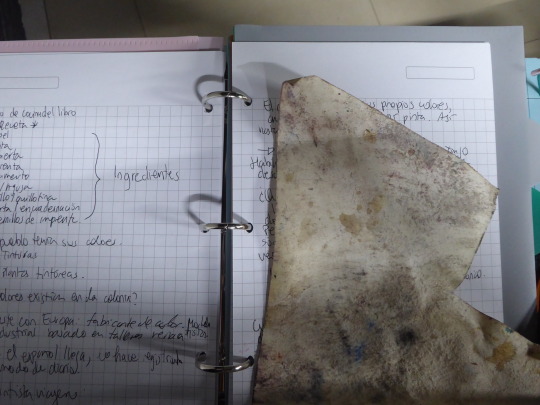


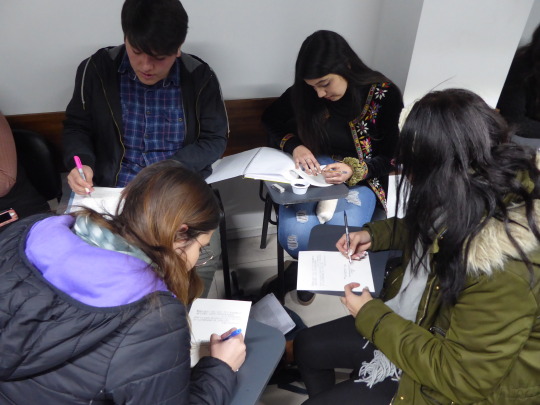
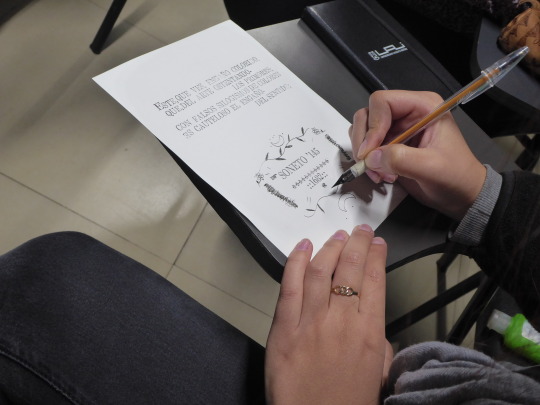
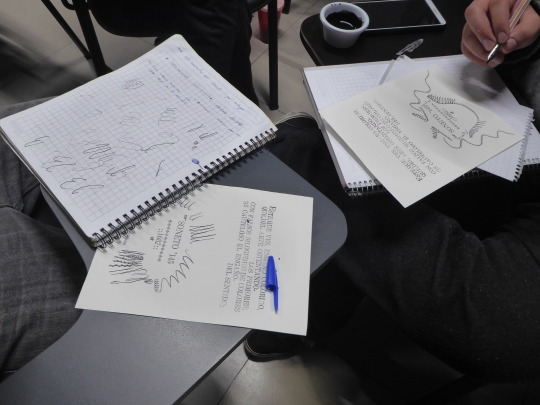
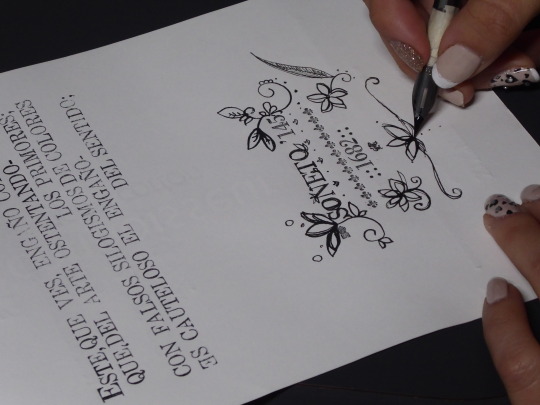
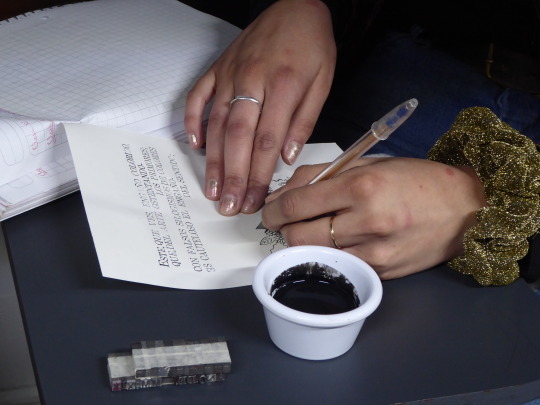

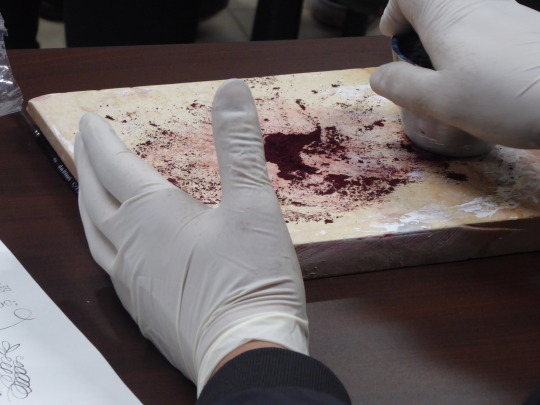
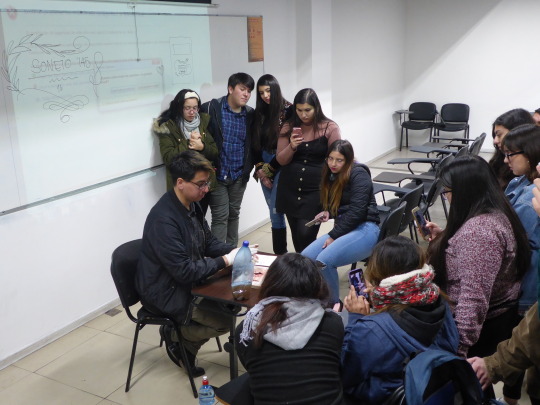

#books#libros#colonial#latinoamerica#latinoamericana#literatura#literature#latinamerican literature#book history#historia del libro
72 notes
·
View notes
Text
Here I am with another random recommendation for latinamerican authors, and if you like chilling, unsettling or just plain tragic short stories, you should read the work of Horacio Quiroga, he was specifically an uruguayan author, and many people have mentioned him as a very early influence for the what would later be called magical realism, because of his matter-of-fact naturalist writing.
Here is a link to what is imo one of his best stories: The Feather Pillow
#rose talks#horacio quiroga#the feather pillow#hispanic literature#latinamerican literature#if you can though#I recomment reading in the original language#there's just so much nuance#that can't be translated with his writing#its called#El almohadon de plumas
6 notes
·
View notes
Text
¡Feliz Navidad!
@a-studying-hobbit I´m your secret Santa!
You said you like literature and history, so I did kinda a mix between both, I hope you like it. I don´t know exactly what you like to read, so I went with literary trends, more or less. I´m sorry I couldn´t do anything in islandic, I couldn´t find information. And I would have needed to use Google translate, for I don´t know islandic.
Literatura renacentista en España (s. XIV - XVII) / Renaissance literature in Spain
Características/ Characteristics:
Lenguaje esteticista/ Beautician language
Humanismo y antropocentrismo/ Humanism and anthropocentrism
Temas/ Topics:
Amor a lo divino/ Love to the divine
Amor a la naturaleza/ Love to the nature
Amor a la mujer/ Love to the woman
Representantes/ Representatives:
Garcilaso de la Vega, Juan Boscán, Santa Teresa de Jesús.
Literatura Renacentista en América/ Renaissance literature in Latin-America
Most of the literature in this century was the Teatro Misionero (Missionary theatre), which had as objective to teach the catholic religion to the indigenous people they were trying to evangelize.
Literatura Barroca (s. XVI-XVII) / Baroque Literature
Características:
Lenguaje ornamentado/ Ornamental language
Temas:
Terror al vacía (Horror vacuí)/ Terror to the emptiness
El tiempo/ The time
La vida y la muerte/ The life and the death
La caducidad de los bienes materiales/ The expiration of material goods
Representantes españoles/ Spanish representatives:
Francisco de Quevedo, Luis de Góngora, Lope de Vega, Pedro Calderón de la Barca, Tirso de Molina
Representantes latinoamericanos/ Latin-american representatives:
Sor Juana Inés de la Cruz, Carlos Sigüenza y Góngora, Bernado Balbuena.
Literatura del Neoclásico (s. XVIII) / Neoclassic literature
Características:
Razón sobre los sentimientos/ Reason over the emotions
Búsqueda del buen gusto/ Search of the good taste
La literatura fue una herramienta de divulgación de ideas y enseñanzas/ Literature was a tool for spreading ideas and teachings
Temas:
(España) Los vicios/ The vices
Críticas a ciertos comportamientos/ Critic to certain types of behaviors
(Latinoamérica) Libertad/ Liberty
Progreso/ Progress
Representantes españoles:
Gaspar Melchor de Jovellanos, Tomás de Iriarte, Félix María Samaniego.
Representantes latinoamericanos:
José Joaquín Olmedo, Rafael Landívar, José María Heredia.
Romanticismo (s. XIX) / Romanticism
Características:
Sentimiento sobre la razón/ Feelings over reason
Exaltación y culto literario al yo/ Exaltation and literary cult to the I
Idealismo/ Idealism
(Latinoamérica) Rechazo de lo español, admiración por el resto de Europa/ Rejection of the spanish, admiration to the resto of Europe
Temas:
Naturaleza/ Nature
Sentimientos/ Feelings
Nacionalismo/ Nationalism
Representantes Españoles:
Fernan Caballero, José de Espronceda, Francisco Martínez de la Rosa
Representantes latinoamericanos:
Esteban Echeverría, Guillermo Blest Gana, Ricardo Palma Soriano.
Realismo (s. XIX- XX) / Realism
Características:
Largas descripciones/ Long descriptions
Monólogo Interior/ Intern monologue
Crítica social/ Social critic
Objetividad/ Objectivity
*In Latin-American, 4 sub-categories of the realism existed:
Novelas Regionalistas (Regionalist novels): Ricardo Güiraldes, Ricardo Palma
Novelas de la Revolución Mexicana (Novels of the Mexican Revolution): Mariano Azuela, Agustín Vera
Novelas gauchistas (Gauchista novels): José Hernandez, Rafael Obligado.
Novelas Indigenistas (Indigenist novels): Jorge Icáza, Luis Eduardo Valcárcer.
Representantes españoles:
Pedro Antonio de Alarcón, Luis Coloma, Vicente Blasco Ibañéz
Realismo Mágico (s. XX) / Magic Realism
This is a literary movement born in Latin-American, and so I´ll only put examples of Latin-American novels.
Características:
Integración de mitos y leyendas/ Integration of myths and legends
Enfoque metafísico del tiempo y el espacio/ Metaphysical approach to time and space
Elementos sobrenaturales/ Supernatural elements
Since this is one of my favorite literary movements, I´ll recommend particular novels, instead of only authors. All of this I have read and loved.
El señor Presidente- Miguel Ángel Asturias (The President)
Cien años de soledad – Gabriel García Márquez (One hundred years of Solitude)
El Reino de este Mundo- Alejo Carpentier (The Kingdom of this world)
Pedro Páramo – Juan Rulfo
Como agua para chocolate – Laura Esquivel (Like water to chocolate)
Modernismo (s. XIX - XX) / Modernism
Características:
Sensualista/ Sensualist
Opulencia/ Opulence
Simbolismo/ Symbolism
Temas:
Lo natural como lugar de éxtasis/ The natural as a place of ecstasy
Representantes españoles:
Salvador Rueda, Manuel Manchado
Representantes latinoamericanos:
Rubén Daría, Manuel Gutiérrez Nájera, Amado Nervo, José Asunción Silva.
Boom Latinoamericano (Second half of the XX century) / Latin-American Boom
This isn´t a literary movement, is more like an editorial phenomenon, but I wanted to add it because is one of the few in which I have more female authors, so bear with me.
Like I said, it´s not a literary movement, so I´ll just put the authors and some novels/poesy/short stories. I recommend them all.
Desolación – Gabriela Mistral (I can´t find the title in English, but the translation would be Desolation)
Cerca del corazón salvaje – Clarice Lispector (Near to the Wilde Heart)
La mujer habitada – Gioconda Belli (The Inhabited Woman)
La ciudad y los perros- Mario Vargas Llosa (The Time of the Hero) Wtf with that translation
Rayuela – Julio Cortazar
Chac Mool- Carlos Fuentes
And here is the end! I left out a lot of world-wide movements, and Latin-American movements, and I´m sure I left out more than half the literature of Spain. Sorry for that but
1) This was already very long and I´m afraid you may find it boring
2) I´m Mexican, so I know a lot more of Latin-American literature than of Spanish literature.
If you want a more specific recommendation, you can ask me directly, for I´ve read most of what I´ve written here. I´m a bit of a history and literature nerd.
Merry Christmas! If you ever need help with your Spanish, or want to practice or talk, you can hit me up!
8 notes
·
View notes
Text
Day #2: Hi! These days I have been reading about the different ways we can establish relationships with our past, lineage and culture. A country such as mine, Colombia, where armed conflict is a reality for many communities, memory studies turn to be relevant in academic spaces (Social Studies).
In Literature Studies, at least here in Latin America (I don't know about EEUU, Europe, Africa, Asia, Oceania), we use the verb knit ("tejer") to refer all kinds of discursivities that surrounds society and how they're interwined. One of them is the cuisine, how flavors and food can create an affective way to interact with our past (and our present).
Here are some fruits and vegetables from Putumayo, Colombia. Have you heard some of them?
(Left to right)
1. "Copoazú"
2. "Coca"
3. "Sacha Inchi"
4. "Cilantro cimarrón"
5. "Espinaca de monte"
6. "Trigo amazónico"
7. "Granadilla de monte"
8. "Zuzuka".
Just a remainder: English is not my native language.
Source: "Recetario de sabores lejanos" (PDF). Ed. Laguna Libros.
Chapter: Finca Amazónica.
Iustrations by: C. Víeco, H. Díaz and D. Sarasti.

#latinamerican literature#literature#spanish literature#colombia#history#memory#cuisine#literature student#amazonía#recetario#dibujo#drawing
1 note
·
View note
Link
Por primera vez, a mi entender, se ha digitalizado una copia de la segunda novela de César Andreu Iglesias. Una novela que básicamente ha sido completamente olvidada. Creo que es hora que le demos un nuevo respiro a esta pieza escrita por uno de nuestros novelistas más importantes. La digitalización es de la primera y única edición que se publicó.
#Puerto Rico#Literatura#Caribe#Libros#Latinamerican Literature#Latino Americano#Cesar Andreu Iglesias#Prócer#Boricua#Livres
0 notes
Text

"Mi táctica es mirarte, aprender como sos, quererte como sos. Mi táctica es hablarte y escucharte construir con palabras un puente indestructible. Mi táctica es quedarme en tu recuerdo. No sé cómo ni sé con qué pretexto pero quedarme en vos. Mi táctica es ser franco y saber que sos franca y que no nos vendamos simulacros para que entre los dos no haya telón ni abismos. Mi estrategia es en cambio más profunda y más simple. Mi estrategia es que un día cualquiera, no sé cómo ni sé con qué pretexto, por fin me necesites."
Táctica y Estrategia, Mario Benedetti.
9 notes
·
View notes
Photo
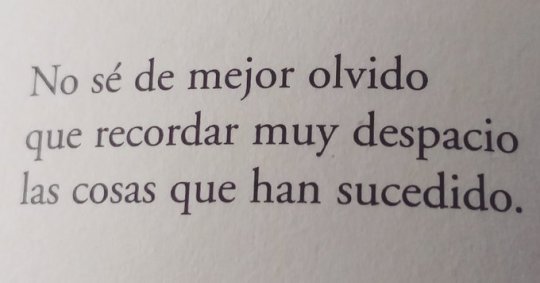
⏤ Luis Alberto de Cuenca
#quotes#quick quote#quote#literature post#latinamerican poetry#latin american poetry#Luis Alberto Cuenca
1 note
·
View note